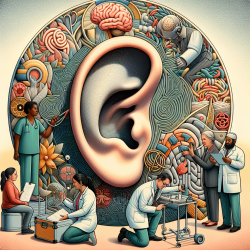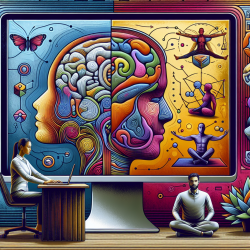Hearing loss and cognitive decline are often interconnected, posing a significant challenge for clinicians aiming to provide holistic care. The research article "An Interprofessional Approach to Aural Rehabilitation for Adults with Hearing Loss and Cognitive Concerns" underscores the importance of a collaborative approach between audiologists and speech-language pathologists to address these dual concerns effectively.
Here are some key takeaways from the research to enhance your practice:
1. Understanding the Relationship Between Hearing Loss and Cognitive Decline
Studies show that untreated hearing loss is linked to a higher risk of developing dementia. This connection is likely due to the increased cognitive load and social isolation resulting from hearing difficulties. By recognizing these links, practitioners can better understand the comprehensive needs of their clients.
2. Importance of Cognitive Screening
Conducting cognitive screenings is within the scope of practice for audiologists. Tools like the Mini Mental State Exam (MMSE) and Montreal Cognitive Assessment (MoCA) can help identify cognitive concerns early. It's crucial to ensure that the screening environment is quiet and free from distractions to get accurate results.
3. Implementing an Interprofessional Approach
Collaborating with speech-language pathologists can significantly enhance the aural rehabilitation process. These professionals are well-equipped to conduct cognitive assessments and interventions, complementing the audiologist's focus on hearing technology and auditory training.
4. Tailoring Hearing Technology
For clients with cognitive concerns, selecting the right hearing technology is vital. Features like slower release time with wide dynamic range compression can facilitate better speech perception. Additionally, custom ear molds and rechargeable instruments can be more user-friendly for individuals with dexterity issues.
5. Educating Clients and Caregivers
Providing clear, client-friendly instructions on the use and care of hearing aids is essential. Use visuals and practice sessions to ensure comprehension. Educating caregivers is equally important, as they play a crucial role in the daily maintenance and use of hearing devices.
6. Supporting Emotional Well-Being
The combined effects of hearing loss and cognitive decline can lead to significant stress for both clients and caregivers. Creating a safe environment for them to express their concerns and providing emotional support can enhance the overall rehabilitation process.
Incorporating these strategies into your practice can lead to better outcomes for clients with hearing loss and cognitive concerns. To read the original research paper, please follow this link: An Interprofessional Approach to Aural Rehabilitation for Adults with Hearing Loss and Cognitive Concerns.










